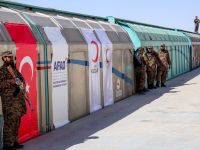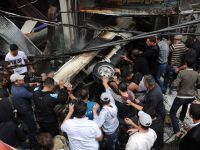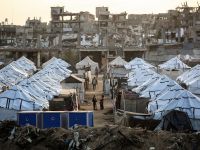By Jihad Abu Falah
Albawaba.com - Amman
The Islamist intellectual and former member of the Lebanese Parliament, Fathi Yakan, reiterated the need for the presentation of a new civilized vision of the real Islam to confront the Western media campaign designed to defame the religion.
Yakan said in an interview with Albawaba.com that Hizbollah has been able to give a good impression about the reality of Islam, which is able to contain and cooperate with other groups when it comes to national interests.
Yakan, a prominent Muslim Brotherhood figure, added that Islamic movements might resort to violence in extraordinary cases particularly when political and social reform becomes impossible.
However, he maintained that any Islamic political experience must not rush things and move gradually to attaining its objectives.
The following are excerpts from the interview:
Q. Recently, some Islamic political movements have arisen and played a key role in the Middle East such as Hizbollah in Lebanon, Jihad and Hamas in Palestine, the Salvation Front in Algeria, other Islamic groups, and even in Iran. Bearing in mind the different levels of these movements in the Arab world, what are your views on this Islamic change?
A: There is a big difference between a movement which starts from the very beginning with political activities coupled with certain military activities, on the one hand, and a movement that starts with a comprehensive Islamist enterprise and moves forward gradually until it assumes its natural role in the political life, on the other. I disagree with any movement that starts with political activities right from the beginning without proper planning and programs. I am also not an advocate of the Islamic movements, which practice violence since their establishment, because we consider the use of force is only justifiable when political and social reforms have become impossible.
Take for example the Muslim Brotherhood; it started at the beginning of the last century with a clear vision and passed through one stage into another resolutely and maturely with no haste to assume power and decision making positions. This is because, in the first place, the movement deems power as a means for reform and not an end in itself.
So, the movement does not rush to reach these positions before it is ready for them. For the Islamic enterprise to succeed and reach position where its vision and ideas can be presented, the Islamists undertaking the project should introduce it the right way.
However, to start a project without securing the basic ingredients for success is not wise if we want to follow the example of Prophet Mohammad. At the beginning his approach to people was ideological and then moved step by step to building up a society and statehood.
The prophet neither went to war, nor did he carry out any forays during the early days, until he established an Islamic state.
Q. Before the fall of the Soviet Union and the end of the Cold War between the two superpowers, the accusation was often made that Islamic movements, particularly the Muslim Brotherhood and the Liberation Party, were used by the West to curb the communist expansion. Now the cold war is over, and the process of globalization is gaining momentum, do you think these charges have been dropped?
A. We should differentiate between exploiting a movement and exploiting the prevailing circumstances. I would like to use the example of the Muslim Brotherhood and Afghanistan. The problem was that the Americans had their own interests in exploiting all the possible events for their benefits. In such cases, they try to overlook the actions of certain groups or movements when they are engaged with US enemies, but this does not mean that they recruit these movements or groups.
In Afghanistan, for example, the Islamic movement was confronting the former Soviet Union and the fact that the US kept silent regarding the movement really meant that America was making use of the circumstances. Again, this does not mean that the Islamic movement was employed by the United States.
However, there may be some auxiliary and peculiar movements such as Ahmadiyyah in Pakistan, which was established to face the original Islamic movement and also the Ahbash in Lebanon who were recruited to strike against the Islamic movement. But the original movements existed years before superpower America came onto the scene.
It is therefore not acceptable to say that these original movements have been established by America. The original Islamic movement does not believe in Machiavellian policies and does not unite with the devil. It is possible that it makes opponent powers fight with each other as prophet Mohammad did in Al Khandaq battle where the enemies of Islam fought with each other and then fled the battle scene.
Q: Speaking of change, it has been noticed in the recent years that Islamist movements, such as Hizbollah, have been able to contain other previously adversary movements such as the pan-nationalists and other groups; would you say that there has been such a change?
A. There is no doubt that work develops and changes day-by-day according to the requirements of the battle and historical stage. However, any change in that direction should be Islamically legitimate. For example, Islam is not opposed to having Christian ministers in an Islamic government, provided that they occupy positions in ministries such as industry, agriculture but not education or justice.
Regarding Hizbollah, we have strong relationships with it since 1982 when it was established. We, as the Muslim Brotherhood, started resistance before Hizbollah when Israel withdrew its forces first from Damour, then from Sabra, and eventually to the border strip. Due to demographic and geographical factors, Hizbollah has played its role in the south more effectively than other groups, while we worked within the areas known to us. The topography of land is very important in military actions. Hizbollah started work and coordination with us in military camps first, and then it developed into joint military operations.
We also coordinated political work at the parliamentary level between 1992-1996 when I was a member of the Islamic bloc at the parliament, which was working hand in hand with Hizbollah’s Wafa’a (Loyalty) Resistance Bloc.
After it had achieved great success in military actions, Hizbollah formulated a new plan to extend resistance operations to all villages. This proved to be a fruitful step since it made others feel that the door to Jihad is open for everybody. Jihad is not restricted to one faction only.
However, despite Hizbollah’s call for others to join it, work remained unilateral for the most part, and many parties in Lebanon were reluctant to join Hizbollah in its endeavors fearing their efforts would be endorsed to the movement, which would take all the credit.
After all, Hizbollah’s experience is considered as a civilized approach of Islam towards other groups. The question that is raised is what will happen to political pluralism if an Islamic regime is established. What is the fate of the national powers and other movements?
I think Hizbollah’s experience is indicative of the reality and essence of Islam, which is based on persuasion of all, and the possibility of cooperation with every body.
In the current circumstances, the western media are hostile to Islam and Islamic movements, accusing them of being extremists who do not accept living with non-Muslims. This gives wrong impressions about Islam. We in Lebanon, as a group, have cooperated with other powers on a daily basis including the Maronites. And in 1996, we formed a complete list of candidates for the parliament including Maronits, Orthodox and Muslims.
© 2000 Al Bawaba (www.albawaba.com)







